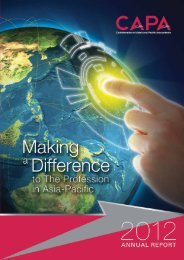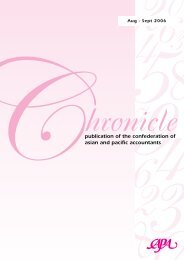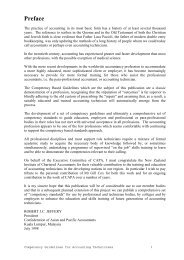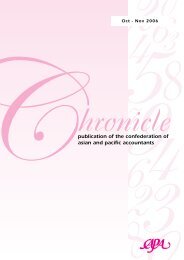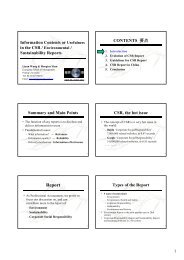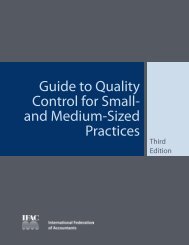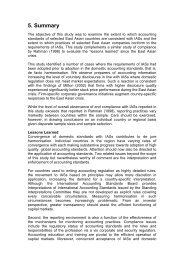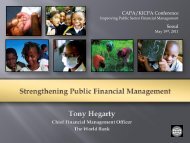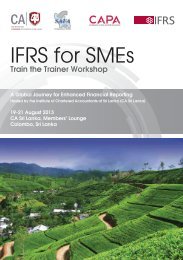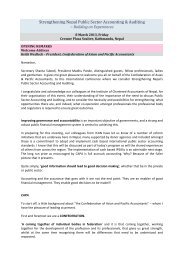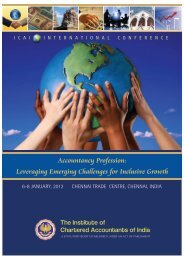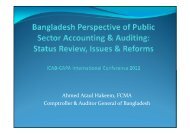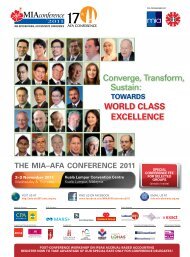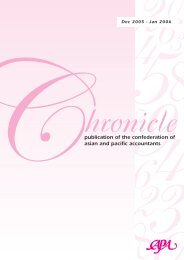MEMBERS NEWSLETTER
MEMBERS NEWSLETTER
MEMBERS NEWSLETTER
- No tags were found...
Create successful ePaper yourself
Turn your PDF publications into a flip-book with our unique Google optimized e-Paper software.
<strong>MEMBERS</strong> <strong>NEWSLETTER</strong>April 2011ICASL to explore recent tax law changes in India and theimpact on foreign multinationalsAs an encouraging number of SriLankan companies branch out toneighbouring India, the Instituteof Chartered Accountants of SriLanka (ICASL) will explore therecent key judicial precedents indirect tax laws implemented India,and the impact such changes posefor multinational enterprises doingbusiness in India.The ICASL has invited Indian TaxExpert Mr. K. T. Chandy, Partnerwith Ernst & Young’s Tax and Regulatory Services Practice to speak on ‘Multinational Enterprises– Key Recent Judicial Precedent in Direct Tax Law,’ at a presentation scheduled to be held onThursday, 5 th May 2011 at the ICASL Auditorium, Colombo 7.Mr. Chandy who is also associated with the Technology, Communications and EntertainmentBusiness Unit in India, will explore on a verity of areas which will be of interest to top Sri Lankanestablishments in the country which have already commenced operations in India or are mulling thepossibility of commencing business in India.During his presentation, Mr. Chandy will focus on why India as a country is suitable for foreignmultinational companies to commence operation in, the legal factors including the present taxincentives available for foreign business to commence operations in India and the exchange control,labour and employment issues which affect such a set-up.He will also argue on important aspects such as the general perception that doing business in hiscountry is difficult, including on the misconceptions of hidden taxes and levies, during thepresentation which will be followed by a Q and A session.Entrance for the lecture will be free and registration will be on a first come first servedbasis.
<strong>MEMBERS</strong> <strong>NEWSLETTER</strong>April 2011ICASL-Amba Valuation Boot Camp makes a comebackFollowing the overwhelming response received and due topopular demand, the highly topical Valuation Boot Camporganized by the Institute of Chartered Accountants of SriLanka (ICASL) and Amba Research Lanka (Pvt) Ltd is dueto make a comeback in May this year.The comprehensive training programme held in Februarytargeting finance and capital market professionals, coveredthe best practices in discounted cash flow-based and relativevaluation techniques for equity securities.Although the February programme had a capacity toaccommodate only 25 participants, owing to theoverwhelming response, the organizers had to increase theparticipants’ capacity to 32.Taking the positive response received and the subsequent requests by financial and capital marketprofessionals, ICASL and Amba has decided to repeat the training programme in May, for thosewho were unable to reserve a spot earlier in February.During the comprehensive two day Valuation Boot Camp programme, the Modules coveredincluded adjusting valuation multiples for relative differences in risk and growth expectations,guidance on identifying appropriate peers, adjusting enterprise value for non-operating assets, andcase studies on setting a target price and constructing a discounted cash flow. A key differentiator inthe program was the multiple case studies on valuing three Sri Lankan IPOs.The programme was delivered by Amba’s senior panel consisting of Senior VP, Global Head ofProjects and Transitions, Chanakya Dissanayake, CFA; VP, Head of Knowledge Management,Aruna Perera, CFA; VP, Head of Training and Development, Aidha Ahamat, Senior AVP, Trainingand Development, Sarah Yusuf and, Deshal Pandithage, and Senior AVP Asanka HerathParticipants in the February programme represented some high end organisations in the likes of theSecurities and Exchange Commission, Capital Alliance, Guardian Fund Management, PWC,KPMG, HNB Securities, Nithya Partners, Ernst & Young, Hayleys, Hemas and Amana Takaful.In February, the ICASL embarked on this initiative together with Amba in its continuing effort tokeep the country’s corporate sector abreast of changing global patterns and trends, ensuring that SriLanka is on an equal platform with its global peers.
<strong>MEMBERS</strong> <strong>NEWSLETTER</strong>April 2011Link with us on LinkedInLink with us on LinkedIn and keep abreast on the latesthappenings at the Institute of Chartered Accountants ofSri Lanka (ICASL).In our continuing efforts to reach our esteemed membership both in Sri Lanka and abroad, theInstitute is now on LinkedIn, the world’s most popular professional social networking site.Connect with us by clicking http://lk.linkedin.com/pub/institute-of-chartered-accountants-of-srilanka/2b/283/6a8ICASL <strong>MEMBERS</strong> - 7 - A- SIDE CRICKET FIESTAThe ICASL <strong>MEMBERS</strong> - 7 - A- SIDE CRICKET FIESTA isscheduled for 22 nd May 2011 (Sunday) at NCC grounds, MaitlandCrescent, Colombo 07.Organized by the Member Relations Committee, the fiesta is expectedto see around 16 to 18 Teams who will take part in the 7-a-side cricketfiesta.Time :9 30 am to 4.00 pmOpen for : ICASL Members & their familiesEntrance : FreeTeam composition: 6 males + 1 femaleEntertainment : Food courts, Kiddies fun games, DJ & ‘Papara’ band,competitions, prizes and surprises
<strong>MEMBERS</strong> <strong>NEWSLETTER</strong>April 2011Accountants go Hawaiian in style!It indeed was a night to remember when chartered accountants came together for a party like noother -- the YCAF Hawaiian Night.Adorned in colourful Hawaiian attire and flower garlands, ushers were seen welcoming guests to anight, which was infused with some electrifying toe-tapping music and a scrumptious seafooddinner, hula dancers, fireworks among a load of other surprises.The successfully concluded fun filled beach party was the first event for 2011 organised by theChartered Accountants Forum (YCAF), held at the Mount Lavinia Hotel’s Tropical hut.
<strong>MEMBERS</strong> <strong>NEWSLETTER</strong>April 2011
<strong>MEMBERS</strong> <strong>NEWSLETTER</strong>April 2011TECHNICAL UPDATE 1Sri Lanka Accounting Standards Bound Volume - 2011The Institute of Chartered Accountants of Sri Lanka (ICASL) recently published the 2011Bound Volume of the Sri Lanka Accounting Standards which will be effective from 1stJanuary 2012 and is based on the corresponding International Financial Reporting Standards(IFRS) and International Accounting Standards (IAS) (2009 bound volume).Quality and reliability of financial reporting is one of the key elements in the successfuldevelopment of the capital market in any country. Successful financial reporting dependsupon, inter alia, the availability of an effective set of Financial Reporting Standards in linewith those prevailing internationally, promulgated by a recognized international StandardSetting body.The Sri Lanka Accounting and Auditing Standards Act No. 15 of 1995 empowers the Instituteof Chartered Accountants of Sri Lanka, from time to time, to adopt and promulgateaccounting standards as may be necessary for the purpose of maintaining uniformity andhigh quality in financial reporting of business enterprises. The Sri Lanka AccountingStandards are largely based on the corresponding International Accounting Standardspromulgated by the International Accounting Standards Board (IASB).However, before adoption, every International Accounting Standard undergoes a due reviewprocess by the Statutory Accounting Standards Committee set in motion by the Institute, toensure that the standard is relevant in the Sri Lankan context. Once a standard is adoptedby its council, it needs to be published in the government gazette for legal purposes. Thecommittee over the years has undertaken the task of reviewing the International AccountingStandards and International Financial Reporting Standards, as and when they are issued bythe IASB and recommending them for adoption by the council of ICASL.In late 2009, the committee together with the Council of ICASL made a vital decision toconverge fully with International Financial Reporting Standards and thereafter to adopt allpronouncements issued by the IASB.Accordingly, the Sri Lanka Accounting Standards in this edition which are effective from 1stJanuary 2012 are based on the corresponding International Financial Reporting Standards(IFRS) and International Accounting Standards (IAS) (2009 bound volume) formulated by theInternational Accounting Standards Board (IASB) and its predecessor InternationalAccounting Standards Committee (IASC) respectively.This latest edition includes all IFRS and IAS, of which the following are new to the Sri Lankanfinancial reporting framework.
<strong>MEMBERS</strong> <strong>NEWSLETTER</strong>April 2011IFRS 1 – First-time Adoption of International Financial Reporting StandardsIFRS 4 – Insurance ContractsIFRS 6 – Exploration for and Evaluation of Mineral ResourcesIAS 29 – Financial Reporting in Hyperinflationary Economies, andIAS 41 - AgricultureAs an integral part of SLFRS and LKAS, an application guidance has been publishedseparately, which includes pronouncements of International Financial ReportingInterpretation Committee (IFRIC) and Standing Interpretations Committee (SICs).TECHNICAL UPDATE 2Banking Act Direction No. 11 of 2007 on Corporate GovernanceThe Central Bank of Sri Lanka issued the above direction on Corporate Governance forLicensed Commercial Banks in Sri Lanka.The direction requires;• The Board of such institutes to present a report on the bank’s internal control mechanismthat confirms that the financial reporting system has been designed to provide reasonableassurance regarding the reliability of financial reporting and the preparation of financialstatements for external purposes has been done in accordance with relevant accountingprinciples and regulatory requirements.• The external auditor of the bank to report on the Directors’ Statement on InternalControl.• The external auditor of the bank to report on the bank’s compliance with the corporategovernance directions in the corporate governance reports.In order to assist the bankers and practitioners to comply with this direction, at the requestof CBSL, the Institute of Chartered Accountants of Sri Lanka (ICASL) has issued the following.• Guidance for Directors of Banks on the Directors’ Statement on Internal ControlThis Guidance consists of the recognized principles for the assessment of internal controlsystems elaborated in the “Framework for Internal Control Systems in BankingOrganizations” issued by the Basel Committee on Banking Supervision as more relevant andappropriate for this specific requirement. This guidance further illustrates theresponsibilities of directors in fulfilling the requirements enunciated by the principles. Inaddition, an illustration of how to document control activities is annexed to this guidance,
<strong>MEMBERS</strong> <strong>NEWSLETTER</strong>April 2011enumerating significant processes and significant accounts to assist the directors in reportingrequirements.• Sri Lanka Standard on Assurance Engagements 3050 – Assurance Report for Banks onDirectors’ Statement on Internal Control (SLSAE – 3050)This Sri Lanka Standard on Assurance Engagements establishes and provides guidance onassurance engagements to report on the Directors’ Statement on Internal Control relating toeffectiveness of internal control mechanism that confirms that the financial reportingsystem has been designed to provide reasonable assurance regarding the reliability offinancial reporting and the preparation of financial statements for external purposes hasbeen done in accordance with relevant accounting principles and regulatory requirements.• Sri Lanka Related Services Practice Statement 4750 – Engagements to report on thecompliance with the corporate governance directive issued by the Central Bank of Sri Lanka(SLRSPS – 4750)This Sri Lanka Related Services Practice Statement 4750 establishes Standards and provideguidance on the directions issued by the Central Bank of Sri Lanka (CBSL), on CorporateGovernance for Licensed Commercial Banks, Section 3(8)(ii)(g) of the Banking Act directionNo. 11 of 2007. These directions require the external auditor of the bank to report on thebank’s compliance with the corporate governance directions in the corporate governancereports.The Guidance and SLSAE 3050 are for the purpose of compliance with the sections 3(8)(ii)(b)and 3(8)(ii)(c) of the Banking Act Direction and SLRSPS 4750 is in compliance with thesection 3(8)(ii)(g) of the Banking Act Direction.The practitioners, banking personnel and other related personnel should be aware of thesedocuments and consider the appropriate Standards / Practice Statement applicable to theengagement.
<strong>MEMBERS</strong> <strong>NEWSLETTER</strong>April 2011TAX UPDATEAmendments to the Value Added Tax (VAT) Act No. 14 of 2002Giving legal effect to the 2011 Budget Proposals, which was passed by the Parliament onMarch 22 nd 2011 and certified on March 31 st 2011, the following changes were made to theVAT Act No 14 of 2002.1. Rate Changes ( Section 2 , Section 25C & Rate Schedules)(a) The reduction of 20% to 12%(i) Effective from 23.11.2010The import or supply of goods referred to in paragraph (a) of the Forth Schedule to ValueAdded Tax Act No. 14 of 2002(ii) Effective from 01.01.2011The supply of –- services by hotels, guest houses, restaurants or similar institutions in so far as suchservices are provided for the holding of wedding receptions and other receptions, whichincludes the hiring of halls for the holding of wedding receptions or other receptions otherthan services provided for the holding of professional conferences, seminars or similarevents; and- financial services mentioned under section 25 of the Value Added Tax Act. (The valueaddition for tax purposes will be calculated after deducting the VAT on financial servicespayable)(the 8% tax savings shall be invested in the fund established in the Central Bank { section25(C) (9) }(b) Expansion of applicable VAT rate for Optional VAT (Sections 25H &25I)Effective from 01.01.2011, the rates applicable and the period in which the business couldremain in the status of optional VAT are expanded as follows.
<strong>MEMBERS</strong> <strong>NEWSLETTER</strong>April 2011PeriodUp to the end ofthe 3 rd yearfrom the dateof registrationFrom thecommencementof the 4 th yearto the end ofthe 6 th yearFrom thecommencementof the 7 th yearto the end ofthe 9 th yearFrom thecommencementof the 10 th yearto the end ofthe 12 th yearRate2%4%8%12%• There is no upper limit of turnover for the application of the above rates2. Exemptions. ( PART II of the First Schedule)(a) Effective from 26.11.2010The import or Supply of –- Petrol specified under HS Code 2710.11.20;- Coal specified under HS Codes 2701.11, 2701.12 and 2701.19;- Bitumen specified under HS Heading 27.14 and HS Code 2713.20;(b) Effective from 29.11.2010The import or Supply of –- Machinery and equipment for manufacture of grain mixed bakery products under HSCodes 8437.10, 8437.80 and 8428.90;
<strong>MEMBERS</strong> <strong>NEWSLETTER</strong>April 2011(c) Effective from 01.01.2011The supply of –- Telecommunication services;- Locally manufactured briquettes and pallets using bio mass wastes;- Goods or services to any infrastructure development project funded through foreign loansor donations directly to government ministries, as approved by the Minister of Finance andgazetted for this purposes;- Goods or services by an institution set up by the Ministry of Defense for the rehabilitationof disable soldiers, so far as the activities are carried out by the participation of suchsoldiers;- Locally developed software;- Services being receipts from re-insurance by any local insurance company by way ofcommission or compensation in an insurance business;- Services being the issue of licenses to local telecom operators by TelecommunicationRegulatory Commission ( TRC)- Educational services; and- Leasing facilities for:- Motor coaches with seating capacity not less than 28 passengers seats and used forpublic transport service by the holder of any passenger service permit issued by theNational Transport Commission or any Provisional Road Passenger Transport Authority ;- Lorries; and- Tractors.The import or Supply of –- Machinery and equipment for the use of leather or footwear industry or bags under HSHeadings Codes.8453.10, 8453.20, 8453.80- High tech medical and laboratory equipment under HS Codes 8479.89.10, and HS Headings90.01 through 90.33;- Motor homes under H S Codes 8703.32.93 and 8703.33.71;
<strong>MEMBERS</strong> <strong>NEWSLETTER</strong>April 2011- Taxi Meters under H S Codes 9029.10.10;- Agricultural machinery and parts under H S Codes 7309.00.10, 8479.89.30,7308.90.10, 8479.89.40, 8433.11, 8433.19 and 8433.90- Light weight electrical and electronic items under H S Codes 8414.51, 8516.32,8516.33, 8516.50, 8516.60.10, 8516.90.10, 8516.71, 8516.72, 8516.79.20, 8517.11,8521.10, 8521.90, 8527.91, 8527.92 8528.72.41, 8528.72.91, 9101.91, 9101.99,9105.11, 9105.19, 9105.21, 9105.29, 9105.91, 9105.99, and 9207.10 ;- - Articles use for Fashion Jewellery manufacturing under H S codes 3926.90.70(3923.10.01) /and H S Headings 28.43, 7018.10, 71.13, 71.14, 71.15, 71.16 and 71.17.- Fruit seeds with effect from August 16, 2010- Telecommunication equipments- Spare parts and accessories for exclusive use by Sri Lanka Transport Board and theDepartment of Sri Lanka Railways.The import of –- Goods to any infrastructure development project funded through foreign loans ordonations directly to government ministries, as approved by the Minister of Finance;- Machinery and High tech equipments for the use of telecommunication industry under H SCodes 8443.32.40, 8517.12.90, 8517.18, 8517.61, 8517.62.10, 8517.62.90, 8517.69,8517.70, 8523.52, 8536.69.10, 8536.69.90, 8536.90.10, 8536.90.90, 8544.11.90, 8544.19,8544.70; and- Aircraft simulators and parts under H S Codes 8805.21 and 8805.29.- Samples in relation to a business worth not more than rupees twenty five thousandsubject to such terms and conditions as prescribed by the director General of Customs3. Extension of input tax restriction { Section 22 (10) }The present restriction of 85% of the output tax is extended up to 100% in respect of any taxinvoices or custom declarations claimed on or after 01.01. 2011.Unabsorbed VAT input credit as at 31.12.2010 calculated within the provisions of the VATAct, is allowable to be claimed with effect from January 1, 2011 on monthly basis againstthe net tax payable for each month (after deducting the input credit against the output tax)
<strong>MEMBERS</strong> <strong>NEWSLETTER</strong>April 2011subject to the lower amount of 10% of the unabsorbed input credit or 5% of the net taxpayable.In a case of a person who does not have any taxable supplies liable to tax with effect fromJanuary 1, 2011, the unabsorbed input credit as at December 31, 2011 may be set off in thefollowing manner subject to the same restriction. (The total claim, not exceeding 10% ofthe unabsorbed input credit as at 31/12/2011 or 5% of the tax payable whichever is lower)(i) Where the registered person is an operator of telecommunication services licensedunder section 17 of the Sri Lanka Telecommunication Act No 25 of 1991, the set off shall bemade against the sum payable as telecom levy.(ii) In the case of a registered person who is liable to pay income tax, the set off shall bemade as against the sum payable by such person as income tax payable effective fromJanuary 1, 2011.(iii) If provisions (i) or (ii) is not applicable the set off shall be made against the sumpayable after January 1, 2011 , by such person as tax under any written law for the timebeing in force, administrated by the Commissioner General of Inland Revenue4. Submission of returns (section 83 and 25B)(a) Monthly returns - zero rated persons, deemed exporters and persons registered duringthe project implementation periodQuarterly returns – for all others with payments on monthly basis(b)Suppliers of Financial ServicesBi-annually with payments on monthly basis – Effective from the 6 month ending 30.06.2011.5. VAT Suspension Scheme(a) The present suspension operated through Textile Quota Board (TQB) and ExportDevelopment Board (EDB) is brought under the Commissioner General of Inland Revenue witheffect from April 1, 2011. The implementation is as specified in the Guidelines by theDepartment.(b) The new suspension scheme with regards to supplies not covered under the aboveschemes is implemented through the Commissioner General of Inland Revenue for thefollowing categories:- Suppliers to exporters- Suppliers to deemed exporters- Suppliers to special projects- Suppliers to persons registered under section 22(7)
<strong>MEMBERS</strong> <strong>NEWSLETTER</strong>April 2011(Relevant Guidelines can be obtained from the department of Inland Revenue or visit theDepartmental Website – www.inlandrevenue.gov.lk)6. Other(a) Time bar relating to assessments ( Section 33)The present time bar provisions relating to fraud or willful evasion is removed.(b) VAT advance payments (WHT) ( Section 26A)The present provisions referred to in section 26A are removed.(c) Penal provisions will be introduced for nonpayment of VAT on self assessment basis underinstallments and the non submission of return for VAT on Financial services(d) 15 day Refunds (Section 22)15 day refund Scheme is removed with effect from April 1. 2011 with the newsuspension scheme is introduced(e) Exemption for SME sector (Section 21)SME sector has been defined for this purpose as the sector in which the annualturnover does not exceed Rs 100 MN. The tax not paid up to December 31.2010, due toexistence of the conflict environment or the financial constrains shall be exempted onsubmission made to the Commissioner General of Inland Revenue subject to assurance offuture compliance.(f) Identification of Islamic Financial transactions: Provisions have been incorporated inthe Act to identify such transactions and the treatment of tax for that.



